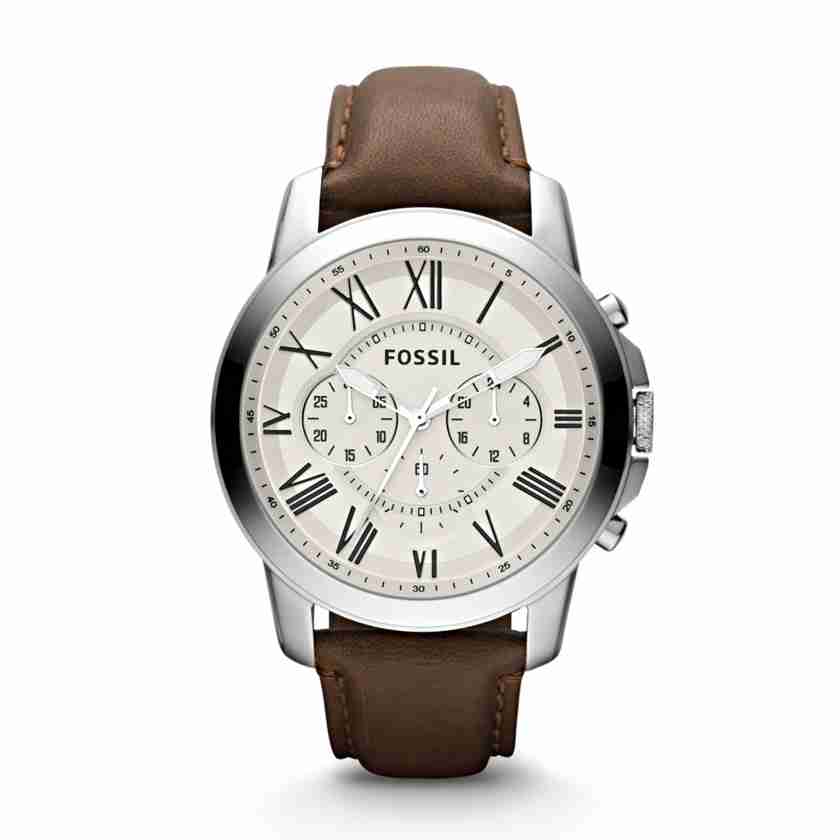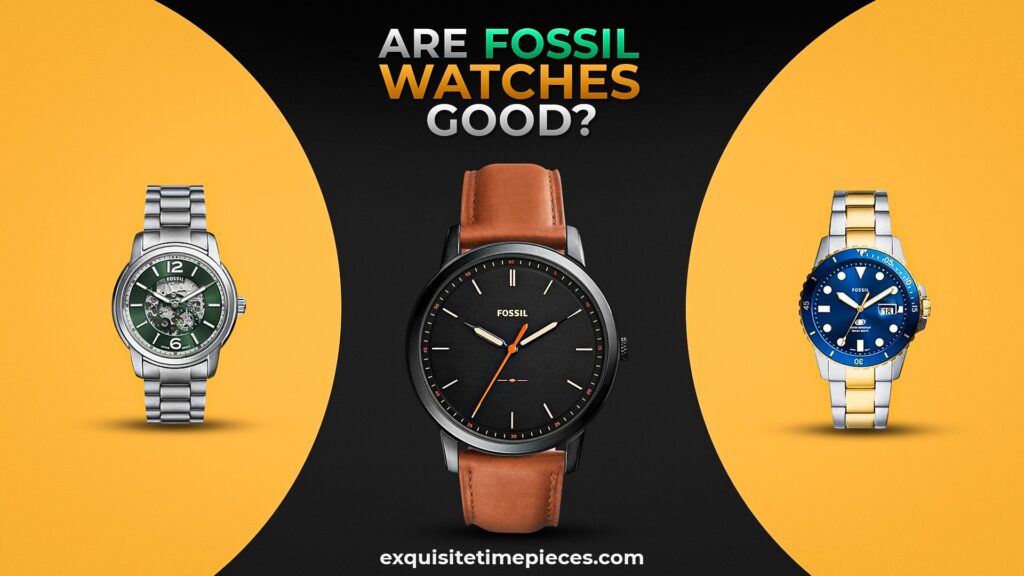Fossil watches. The name evokes a certain image, doesn’t it? Perhaps it’s a vintage-inspired design, a trendy chronograph, or maybe just a familiar sight in department store displays. But the question remains: Are Fossil watches good? This isn’t a simple yes or no answer. It’s a question that delves into the heart of what we value in a timepiece: style, quality, durability, and of course, price. In today’s watch market, flooded with microbrands, smartwatches, and luxury icons, Fossil occupies a unique space. They aren’t trying to compete with the high-end Swiss brands, nor are they solely focused on the tech-heavy features of smartwatches. Instead, they carve out a niche by offering fashionable, accessible timepieces that appeal to a broad audience.
The relevance of this question stems from the sheer popularity of Fossil watches. They are ubiquitous, easily found, and often the first “real” watch many people own. They represent an entry point into the world of horology, a stepping stone from digital watches to something more sophisticated. Understanding their strengths and weaknesses is crucial for anyone considering purchasing one, or for anyone simply curious about the watch market as a whole. In a world where our phones tell the time, wearing a watch is often a conscious choice, a statement of personal style and a reflection of our values. So, is a Fossil watch a good choice? Let’s delve into the details.

The current context is also important. The watch industry is undergoing rapid changes. Smartwatches are challenging traditional timepieces, and online retailers are disrupting established distribution channels. Fossil, like other traditional watch brands, is adapting to this new landscape. They are incorporating smartwatch technology into some of their designs, expanding their online presence, and experimenting with new materials and styles. This makes it even more important to understand what Fossil offers and how it compares to the competition. Are they keeping up with the times? Are they still offering good value for the money? These are the questions we will explore in this detailed analysis.
Ultimately, deciding whether a Fossil watch is “good” is a subjective decision. It depends on your individual needs, preferences, and budget. This article aims to provide you with the information you need to make an informed decision, to weigh the pros and cons, and to determine whether a Fossil watch is the right choice for you. We’ll examine their history, their design philosophy, their quality, and their overall value proposition, leaving no stone unturned in our quest to answer the question: Are Fossil watches good?
Brand Overview and History
Fossil, as a brand, has a surprisingly long and interesting history. Founded in 1984 by brothers Tom and Kosta Kartsotis, the company initially focused on fashion watches inspired by vintage designs. This retro aesthetic became a defining characteristic of the brand and helped them stand out in a crowded market. They didn’t try to reinvent the wheel, instead, they cleverly tapped into the nostalgia for classic styles, making them accessible to a wider audience.
Early Success and Expansion
Fossil’s early success was largely due to its ability to capture the zeitgeist. The 1980s and 1990s were a time of increased consumerism and a growing interest in fashion accessories. Fossil capitalized on this trend by offering stylish and affordable watches that appealed to young professionals and fashion-conscious consumers. Their commitment to design, combined with a savvy marketing strategy, quickly propelled them to the forefront of the fashion watch industry. They expanded beyond watches, introducing leather goods, jewelry, and apparel, solidifying their position as a lifestyle brand.
- Focused on vintage-inspired designs from the beginning.
- Expanded product lines to include leather goods and accessories.
- Built a strong brand identity through consistent marketing and design.
Acquisitions and Diversification
Over the years, Fossil has made several strategic acquisitions to expand its portfolio and expertise. One notable example is the acquisition of Swiss watch manufacturer Zodiac in 2001. This acquisition gave Fossil access to Swiss watchmaking technology and expertise, allowing them to produce higher-quality timepieces. They also acquired Skagen Designs, a Danish watch brand known for its minimalist aesthetic. These acquisitions demonstrate Fossil’s commitment to diversification and its desire to cater to a wider range of tastes and preferences.
Swiss Made Collection
The Swiss Made collection is a direct result of the Zodiac acquisition. These watches feature Swiss movements and are assembled in Switzerland, offering a higher level of quality and craftsmanship than Fossil’s standard models. While still relatively affordable compared to other Swiss brands, the Swiss Made collection represents a significant step up in terms of quality and price. This shows Fossil’s ambition to cater to more discerning watch enthusiasts.
Fossil Today: Smartwatches and Sustainability
In recent years, Fossil has embraced smartwatch technology, integrating it into many of its designs. This allows them to compete in the rapidly growing smartwatch market while maintaining their focus on style and design. They have partnered with Google to use Wear OS, providing users with a wide range of features, including fitness tracking, notifications, and access to apps. Fossil is also increasingly focused on sustainability, using recycled materials in its products and packaging, and implementing more environmentally friendly manufacturing processes. This reflects a growing awareness of environmental issues among consumers and a desire for brands to be more responsible.
Fossil’s commitment to sustainability is evident in their Gen 6 series of smartwatches, which feature improved battery life and faster charging times. They are also using more sustainable materials in the construction of their watches, such as recycled stainless steel and eco-leather. This demonstrates a genuine effort to reduce their environmental impact and appeal to environmentally conscious consumers.
However, there are criticisms. Some argue that Fossil’s smartwatches, while stylish, don’t always match the performance of dedicated fitness trackers or higher-end smartwatches. Others point out that their mechanical watches, while aesthetically pleasing, may not offer the same level of precision and durability as watches from more specialized brands. These are valid concerns that potential buyers should consider. The key takeaway is that Fossil is a fashion-focused brand that offers a wide range of watches, from affordable quartz models to higher-end Swiss Made timepieces and smartwatches. Understanding their strengths and weaknesses is essential for making an informed decision.
Design, Materials, and Build Quality
Fossil’s design philosophy centers on creating fashionable and accessible watches that appeal to a broad audience. They draw inspiration from vintage designs, contemporary trends, and classic styles, resulting in a diverse collection that offers something for everyone. However, this focus on fashion sometimes comes at the expense of material quality and build quality. It’s important to understand the trade-offs involved when considering a Fossil watch.
Design Aesthetics and Variety
One of Fossil’s greatest strengths is its wide range of designs. Whether you’re looking for a classic dress watch, a sporty chronograph, or a trendy smartwatch, you’re likely to find something that appeals to you in their collection. They offer watches in a variety of sizes, colors, and styles, ensuring that there’s something for every wrist and every taste. This variety is a key selling point for Fossil, as it allows them to cater to a diverse customer base.
- Wide range of styles, from classic to contemporary.
- Variety of sizes to fit different wrists.
- Constantly updating designs to reflect current trends.
Materials Used in Fossil Watches
Fossil primarily uses stainless steel for its watch cases, which is a durable and corrosion-resistant material. However, the quality of the stainless steel can vary depending on the specific model. Some models may use lower-grade stainless steel, which is more prone to scratches and dents. The crystals used in Fossil watches are typically mineral crystal, which is more scratch-resistant than acrylic crystal but less scratch-resistant than sapphire crystal. The straps are usually made of leather, stainless steel, or silicone, depending on the style of the watch.
Leather Quality
The quality of the leather used in Fossil straps can also vary. Some straps are made of genuine leather, while others are made of bonded leather or synthetic leather. Genuine leather is generally more durable and comfortable than bonded or synthetic leather. It’s important to check the specifications of the watch to determine the type of leather used in the strap. Also, be aware of the tanning process used, as some tanning processes are more environmentally friendly than others.
Build Quality and Durability
The build quality of Fossil watches is generally decent for the price point. However, it’s important to remember that these are fashion watches, not high-end timepieces. The movements are typically quartz movements, which are reliable and accurate but not as prestigious as mechanical movements. The water resistance of Fossil watches is typically 30-50 meters, which is sufficient for everyday wear but not suitable for swimming or diving. The case finishing is generally good, but it may not be as refined as that of more expensive watches.
Durability is a key consideration when evaluating any watch. Fossil watches are generally durable enough for everyday wear, but they may not withstand the rigors of more demanding activities. If you’re looking for a watch that can withstand swimming, diving, or other water sports, you’ll need to look for a model with a higher water resistance rating. You should also consider the type of crystal used in the watch, as sapphire crystal is significantly more scratch-resistant than mineral crystal.
| Material | Pros | Cons |
|---|---|---|
| Stainless Steel | Durable, corrosion-resistant | Can vary in quality |
| Mineral Crystal | More scratch-resistant than acrylic | Less scratch-resistant than sapphire |
| Leather | Comfortable, stylish | Can vary in quality, requires maintenance |
In conclusion, Fossil watches offer a wide range of designs and styles at an affordable price. However, the material quality and build quality may not be as high as that of more expensive watches. It’s important to consider your needs and priorities when evaluating a Fossil watch. If you’re looking for a fashionable and affordable timepiece for everyday wear, a Fossil watch may be a good choice. However, if you’re looking for a high-quality, durable watch that will last for many years, you may want to consider other options.
Price, Value, and Competition
Fossil’s pricing strategy is a key factor in its success. They position themselves as an accessible brand, offering stylish watches at affordable prices. This makes them an attractive option for consumers who are looking for a fashionable timepiece without breaking the bank. However, it’s important to consider the value proposition of Fossil watches in relation to their competitors. Are you getting good value for your money, or are there better options available at a similar price point?
Pricing Tiers and Target Audience
Fossil’s watches are generally priced in the $100-$300 range, with some models, such as the Swiss Made collection, costing more. This price point puts them in direct competition with other fashion watch brands, as well as some entry-level Swiss brands. Their target audience is primarily young professionals and fashion-conscious consumers who are looking for a stylish and affordable timepiece. They appeal to those who value design and aesthetics over technical specifications or horological heritage.
- Price range typically between $100 and $300.
- Target audience: young professionals and fashion-conscious consumers.
- Competes with other fashion watch brands and entry-level Swiss brands.
Value Proposition: Style vs. Substance
Fossil’s value proposition is primarily based on style and design. They offer a wide range of fashionable watches that are constantly updated to reflect current trends. However, some critics argue that their focus on style comes at the expense of substance. The movements are typically quartz movements, which are reliable but not as prestigious as mechanical movements. The materials used in the cases and straps are generally of decent quality, but they may not be as durable as those used in more expensive watches. This raises the question: are you paying for style or substance?
Expert Insights
Many watch enthusiasts argue that at the $200-$300 price point, there are better options available in terms of quality and craftsmanship. Brands like Seiko, Citizen, and Orient offer watches with automatic movements, which are considered to be more desirable by many watch enthusiasts. These brands also have a longer history of watchmaking and a reputation for producing durable and reliable timepieces. However, these brands may not offer the same level of fashion-forward design as Fossil.
Competition and Alternatives
Fossil faces stiff competition from a variety of brands, including other fashion watch brands like Michael Kors and Daniel Wellington, as well as entry-level Swiss brands like Tissot and Swatch. In addition, they also compete with smartwatches from brands like Apple and Samsung. Each of these brands offers a different value proposition, and it’s important to consider your needs and priorities when choosing a watch.
Comparing Fossil to its competitors is essential for determining its value. Michael Kors and Daniel Wellington offer similar fashion-focused designs at a comparable price point. However, these brands are often criticized for using lower-quality materials and movements. Tissot and Swatch offer entry-level Swiss watches with automatic movements at a slightly higher price point. These watches offer better quality and craftsmanship but may not be as stylish as Fossil watches. Smartwatches offer a wide range of features, including fitness tracking, notifications, and access to apps. However, they typically require frequent charging and may not be as durable as traditional watches.
| Brand | Price Range | Strengths | Weaknesses |
|---|---|---|---|
| Fossil | $100-$300 | Stylish designs, affordable | Quartz movements, may not be as durable |
| Michael Kors | $150-$400 | Fashion-forward designs | Lower-quality materials |
| Daniel Wellington | $100-$250 | Minimalist designs, affordable | Limited features, basic movements |
| Tissot | $300-$1000 | Swiss-made, automatic movements | Higher price point, less fashion-focused |
Ultimately, the value of a Fossil watch depends on your individual needs and preferences. If you’re looking for a stylish and affordable timepiece for everyday wear, a Fossil watch may be a good choice. However, if you’re looking for a high-quality, durable watch with an automatic movement, you may want to consider other options. It’s important to weigh the pros and cons of each brand and choose the watch that best fits your needs and budget.
Summary and Recap
So, are Fossil watches good? As we’ve explored, the answer is nuanced and depends heavily on individual needs and expectations. Fossil excels at providing fashionable, accessible timepieces that appeal to a broad audience. Their vintage-inspired designs and trendy aesthetics make them a popular choice for those seeking a stylish accessory rather than a horological masterpiece. They offer a wide variety of styles and sizes, ensuring there’s something for almost everyone.
However, it’s crucial to acknowledge the limitations. Fossil watches primarily utilize quartz movements, which, while reliable and accurate, lack the prestige and craftsmanship of mechanical movements. The materials used, while generally decent, may not be as durable or high-quality as those found in more expensive watches. The water resistance is often limited, making them unsuitable for serious water activities. Therefore, if you prioritize technical specifications, durability, or horological heritage, Fossil may not be the ideal choice.
Fossil’s value proposition lies in its ability to deliver style at an affordable price. They are a great entry point into the world of watches for many people. For those who prioritize fashion and accessibility, Fossil offers a compelling option. But, when compared to competitors like Seiko, Citizen, and Tissot, which offer automatic movements and a greater emphasis on craftsmanship at similar or slightly higher price points, the value equation becomes more complex. Smartwatches also present a challenge, offering a range of features that traditional watches lack.
In conclusion, here’s a recap of key points to consider when evaluating Fossil watches:
- Style and Design: Fossil excels at creating fashionable and trendy watches.
- Price and Accessibility: They offer watches at an affordable price point, making them accessible to a wide audience.
- Material and Build Quality: While decent, the materials and build quality may not be as high as that of more expensive watches.
- Movement: Primarily uses quartz movements, which are reliable but lack the prestige of mechanical movements.
- Competition: Faces competition from other fashion watch brands, entry-level Swiss brands, and smartwatches.
Ultimately, the decision of whether or not a Fossil watch is “good” is a personal one. Consider your priorities, your budget, and your intended use. If you value style and affordability above all else, a Fossil watch may be a great choice. However, if you’re looking for a high-quality, durable timepiece with an automatic movement, you may want to explore other options.
Frequently Asked Questions (FAQs)
Are Fossil watches waterproof?
Most Fossil watches have a water resistance rating of 30-50 meters, which means they can withstand splashes of water and brief immersion. However, they are not suitable for swimming, showering, or diving. For water activities, you’ll need to look for a watch with a higher water resistance rating, such as 100 meters or more.
What type of movement do Fossil watches use?
The majority of Fossil watches use quartz movements, which are battery-powered and known for their accuracy and reliability. Fossil also offers a Swiss Made collection that features Swiss automatic movements, which are more complex and require no battery. These Swiss Made watches are typically more expensive than the quartz models.
How long do Fossil watches last?
The lifespan of a Fossil watch depends on several factors, including the type of movement, the quality of the materials, and how well it is cared for. A quartz Fossil watch can last for several years with proper care, while a Swiss Made automatic Fossil watch can last for many years with regular servicing. Replacing the battery regularly in quartz watches is also important.
Are Fossil watch straps interchangeable?
Yes, many Fossil watches feature interchangeable straps, allowing you to customize the look of your watch. Fossil offers a wide variety of straps in different materials and styles, including leather, stainless steel, and silicone. The strap width is typically indicated in the watch specifications.
Where are Fossil watches made?
Fossil watches are manufactured in various locations around the world, including China and Switzerland. The Swiss Made collection is assembled in Switzerland, while the majority of other Fossil watches are manufactured in China. The specific manufacturing location may vary depending on the model.



